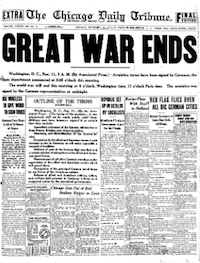While from a proud tower in the town / Death looks gigantically down
Edgar Allan Poe, "The City in the Sea"
By any geopolitical measure the First World War was the most stupendous catastrophe in recorded history. The statistically minded may protest that Hitler, Stalin, Mao and their ilk killed more people, but only because World War I paved their road to power. In the apt words of H.G. Wells "The Great War opened the Gates of Hell".
In modern imagination the Second World War has gone far to blot out memory or closer examination of the First. Also it involved much more geography, featured more malevolent villains, and thus lent itself to a clearer narrative of Good vs. Evil.
Yet in its essence the 1939-1945 conflict was but a continuation of the clash of 1914-1918. The same central protagonists pursued very similar war aims but this time with even more terrifying weaponry, and ruthlessness.
Even the Cold War of 1947-1991, communism vs. capitalism, is directly traceable to the events of 1914-1918. The Russian Revolution and the "Evil Empire" it spawned would have been inconceivable absent the epic military slaughter and economic devastation suffered by the Russian people between 1914 and 1917.
Thus the twentieth century, which began as the buoyant and optimistic heir to the previous century of unparalleled peace and progress, stumbled — by an improbable chain of events beginning with an assassination in a remote Balkan city — onto a path that made it the bloodiest epoch in human history, the reverberations of which still echo in our own time.
The fact of 30 million civilian and military war dead in the compressed space of just four years posed a question that could not be answered, a question that fatally undermined the faith, confidence, and values that had been the rock-like foundation of a civilization built in Europe over centuries, and which by 1914 had come to dominate the entire planet.
The most tragic legacy of this now distant conflict is that it effectively sounded the death knell for Western civilization as that entity was understood from the Renaissance to modern times.
In the first month of the war, the King of England saluted his departing armies with the phrase "God with us," while just across the North Sea in the same week the German Kaiser proclaimed the motto of his armies to be the identical claim, "Gott mit uns".
Nothing could reconcile what was said with what happened. Nothing could assuage the pain of the millions of widows of the "glorious dead" on both sides. Nothing could undo the spiritual maiming that afflicted victors and vanquished alike.
The United States only entered the war in its third year, April 1917. It took a full year, however, before America's Switzerland-sized army could be expanded, trained, and transported across the Atlantic. Nonetheless the timely arrival of two million "Doughboys" in the spring and summer of 1918 proved decisive in tipping the balance in favor of the Allies and was mainly responsible for the war's abrupt end with the Armistice declared at 11 a.m. on November 11th.
Thus the United States was critical to victory but was spared the monumental battering and bloodletting experienced by their allies and enemies alike in the 3 1/2 years before their arrival.
The French Premier George Clemenceau cynically but prophetically remarked in late 1917 that "The Americans have stood aside as observers of this drawn-out Western suicide pact — but mark my words, before this European civil war is finally over it is likely they who will rule the rubble."
The lines from Poe, quoted above, were mined by Barbara Tuchman for the title of her brilliant 1962 book The Proud Tower, which described a Western civilization of unmatched dynamism and accomplishment at its zenith, poised for even brighter days ahead, but which instead tumbled into an abyss— a fall from which there would be no recovery, not just for that "Lost Generation" but for those who came after as well.
Writing to his wife Edith from the Paris peace conference in January 1919, President Woodrow Wilson — savior in war but unable to deliver salvation in peace — remarked that "despite the celebration of victory by many, I am greatly distressed to encounter so many thoughtful men who are downcast and depressed over all that has happened."
Small wonder and still true a century hence.
Bill Moloney’s columns have appeared in the Wall St. Journal, USA Today, Washington Post, Washington Times, Philadelphia Inquirer, Baltimore Sun, Denver Post and Human Events.
